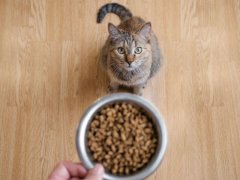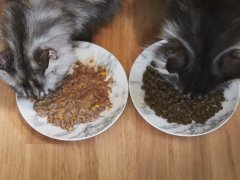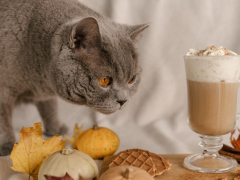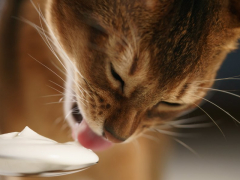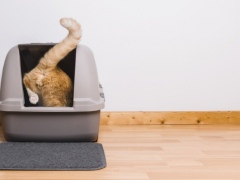
Almonds are great for human health. They are proven to lower the risks of heart disease and lower cholesterol, blood pressure, and blood sugar. But if you’re a cat owner looking for foods to keep your cat healthy, are almonds a good choice? Can cats eat almonds? What if your cat helps themselves to the almond topping on your homemade tart?
However, there are plenty of risks and considerations when it comes to feeding your cat almonds. Let’s investigate whether cats can eat almonds safely.
Are Almonds Healthy for a Cat?
Cats, like humans, require protein for the growth and repair of their body tissues. So, in theory, almonds could provide a valuable source of protein to your cat. At the same time, the unsaturated fats could keep their skin, fur, and joints healthy.
The high fiber content in almonds could also help keep their stools moving and prevent gut problems like constipation and diarrhea.
Another benefit of both protein and fiber is that it could keep your kitty feeling satisfied for longer, meaning they’re less at risk of overeating or becoming overweight.
Almonds are full of antioxidants, like vitamin E, which can help reduce inflammation and the risk of cancer in humans. Almonds also lower cholesterol, blood sugar, and blood pressure in humans, which may also be the case in our cats.
However, despite these potential benefits, there are a few reasons why almonds are not a great choice for your furry family member. Keep reading to find out the risks of feeding almonds to your cat.
How Many Almonds Can a Cat Eat?
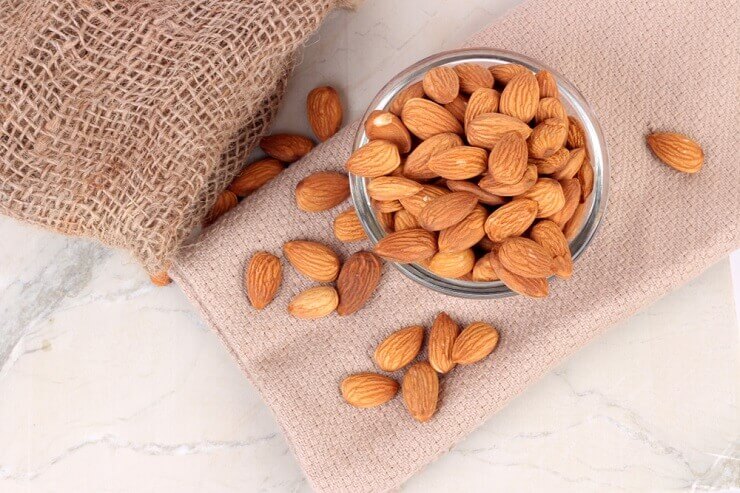
Almonds are full of antioxidants, like vitamin E, which can help reduce inflammation and the risk of cancer in humans.
The ASPCA lists sweet almonds as non-toxic to cats, so if they accidentally eat one or two, it shouldn’t cause them any serious harm. That being said, they could cause your cat a stomach upset or pancreatitis and they are a choking hazard.
Therefore, they’re not ideal if you’re looking for a tasty treat or titbit for your feline friend. Almond milk and almond butter may be better for your cat than dairy alternatives, but they still contain a lot of fat.
Also Read: Is Milk Good For Cats?
How Often Can a Cat Eat Almonds?
Cats are obligate carnivores, which means that their diet should mainly be animal protein. This fact, combined with the risks of upsetting your cat’s tummy or causing them to choke, means it’s best to have a rethink if you’re planning to feed almonds to your cat regularly.
Are Almonds Used in Commercial Cat Food?
Almonds don’t tend to be used in commercial cat food, perhaps because the main ingredient of commercial cat food tends to be animal protein rather than protein from other sources.
Are Almonds Bad for Cats? Are They Toxic?
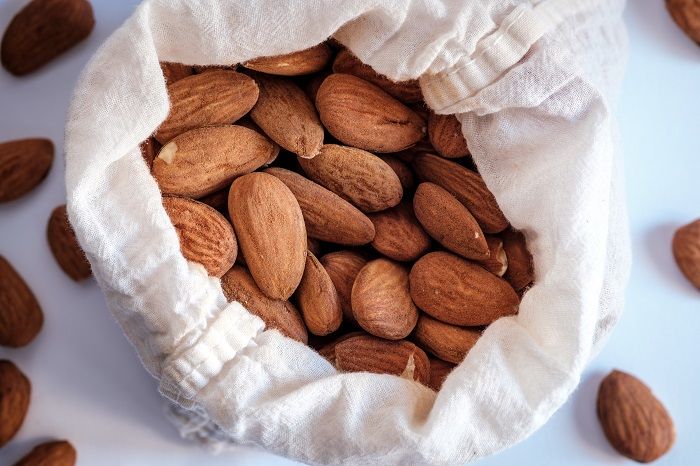
The most important risk to consider before you give your cat almonds is whether they are sweet almonds or bitter almonds. Sweet almonds are the kind that is sold in supermarkets for human consumption.
Bitter almonds are toxic to humans and cats because they contain cyanogenic glycosides which cause cyanide poisoning. If you think your cat may have eaten even a tiny amount of bitter almond, you must contact your veterinarian urgently.
Because sweet almonds are fatty and hard to digest, they often cause cats to have vomiting, diarrhea, and other signs of an upset stomach. They could even cause a painful condition called pancreatitis. Their texture and size also pose a choking hazard to your kitty and could even get lodged while passing through their intestines.
So, what about almond milk? Is that safe for cats?
While almond milk is more digestible for your cat and eliminates the risk of choking, it’s not necessary for your cat’s nutrition. It is, however, far preferable to cow’s milk because cats are lactose intolerant. Almond butter is also preferable to dairy butter, but its high-fat content could still upset your cat’s digestive system.
Whenever you consider sharing some human food with your cat, it’s worth remembering that their commercial cat food contains all the nutrients they need. By feeding them treats or little extras, you could disrupt the balance of their diet, leading to nutritional deficiencies.
Do Cats Like the Taste of Almonds?
Every cat is different, so it’s impossible to generalize what foods they do and don’t enjoy the taste of. However, as obligate carnivores, it’s unlikely that cats would be particularly interested in eating almonds, although there are always exceptions to the rule!
